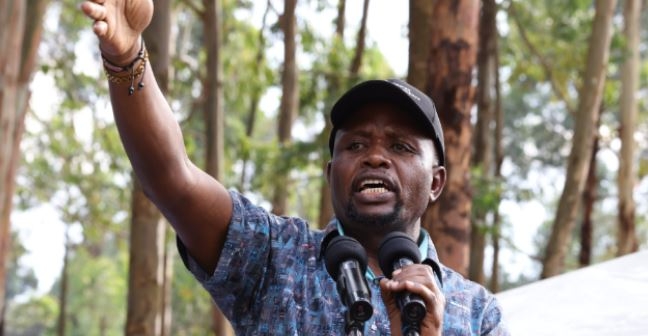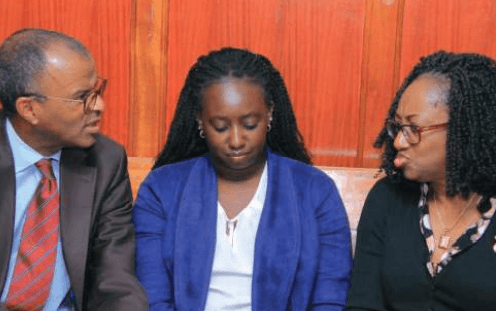Limping and looking haggard, Mia Ndambuki* drags a chair next to her hospital bed.
Her tired eyes, shadowed by a lack of sleep, tell a story of pain and despair.
At 30, Mia has navigated the harrowing journey of losing three pregnancies, enduring the mental and physical toll of post-abortion care services for the past three months.
“I came to the hospital in July for a check-up because I was pregnant. I needed to know about prenatal care and nutrition,” she shares.
On that fateful day, an ultrasound revealed devastating news: a blighted ovum.
Cleveland Clinic defines this condition as a fertilised egg that implants in the uterine lining but fails to develop into an embryo.
“I was desperate,” Mia recalls, her eyes welling with tears.
“I pleaded with the doctors for help, but I couldn’t believe it was impossible. I went home to talk to my husband, who tried to console me.”
Days later, Mia received a call from the hospital instructing her to return for a procedure to clean her womb. According to Marie Stopes Kenya, post-abortion care often involves medical or surgical interventions to ensure the uterus is empty and to treat any complications that may arise.
“They warned me that if I ignored this, I could get infected by the rotting ovum,” she says, her voice trembling.
Despite her heartbreak over losing yet another pregnancy, Mia felt unprepared for the medical procedure ahead.
“All I wanted was to have a baby after three miscarriages,” she laments. The ovum was seven weeks and five days old when she was prescribed medication at the hospital.
At exactly 6 pm, Mia began to bleed profusely.
“I bled for about six hours non-stop,” she recounts, her face contorted with pain.
“I spent two hours in the toilet, overwhelmed by the discharge and bleeding.” After the initial treatment, the doctor sent her home with a prescription, advising her to return if complications arose.
The following morning, Mia experienced severe abdominal pain, accompanied by discharge.
“It felt like my uterus was contracting,” she explains.
The pain persisted, prompting her to seek further medical attention. At the hospital, doctors informed her that the medication had resulted in an incomplete abortion, necessitating a referral for minor surgery.
“Under anaesthesia, they operated on me. This wasn’t my first experience; after my second miscarriage, they lacked the equipment to perform the cleaning,” she recalls, fear evident in her voice.
“I was terrified they wouldn’t clean me properly, but they tried. I still suffer from dizzy spells and severe headaches.”
Mia has been married for four years, but the societal pressures surrounding pregnancy weigh heavily on her.
The World Health Organisation reports that many women face societal pressures that lead to unintended pregnancies.
In 2019, approximately 200 million women who wanted to avoid pregnancy had no access to modern contraception.
A health practitioner at the facility Job Ogutu, explains the two types of post-abortion care: medical and surgical.
“For medical care, we offer medications to help expel the pregnancy; for surgical care, evacuation occurs based on assessment,” he says.
“Afterward, we counsel patients on the importance of delaying subsequent pregnancies.”
Ogutu said patients should ideally wait at least three months before attempting to conceive again.
“Some are advised to wait even longer to ensure a quality recovery,” he adds.
The facility tracks these women to ensure postoperative care and monitor for complications.
Mia’s case is not isolated. After two days of care in the hospital, another patient, Mwea Njoki*, sits on the edge of her bed, dressed in a simple gown that feels foreign against her skin.
Vulnerability flickers across her face as she processes the experience of losing a pregnancy.
“I came here for care after losing my pregnancy two days ago. They put me on painkillers,” Njoki says, her smile hinting at resilience.
Njoki, currently pursuing a Bachelor of Education (Arts) degree, recalls her experience with pain and guilt following her loss.
“I felt dirty and guilty for ending a life that was being formed,” she admits.
However, she found solace in counselling provided at the hospital, which helped her process her emotions and reduce her feelings of guilt.
According to the African Population & Health Research Centre, nearly 464,690 induced abortions occur annually in Kenya. Njoki, like many women, faced the fear of stigma.
“I wanted to avoid a place where everyone would know about my loss,” she explains. “I just walked into emergency and told the nurse I was bleeding; I was immediately admitted.”
Grace Mwangi, Malindi subcounty’s reproductive health coordinator, emphasises the importance of counselling during post-abortion care.
“We provide a shoulder to lean on for women who have lost someone they love,” she says.
“We also offer contraceptive services which include counselling and provision of contraceptive methods according to their choices and link them to other reproductive health services such as cervical cancer screening and other health services.”
Mwangi said many cases of pregnancy loss come through emergency departments, often under dire circumstances.
“Some women arrive critically bleeding or with infections,” she says.
Unfortunately, the stigma surrounding post-abortion care remains pervasive. Many women are reluctant to discuss their experiences, instead describing their situations as inevitable losses.
The shortage of trained medical personnel exacerbates the issue.
“We often have limited staff trained in post-abortion care, and those who are trained may be on leave,” Mwangi explains.
“The stigma is high, even among healthcare providers, which affects service delivery.”
Cultural barriers further complicate access to necessary services. “Some communities are unaware of available services, leading to women's failure to seek post abortion services and most women seeking services due to complications following abortion,” Mwangi says.
To combat this, the hospital collaborates with health promoters and Marie Stopes Kenya to advocate for post-abortion care services.
She says lack of information is also a major cause of alarm.
“Some people or women miscarry naturally and because they feel its abortion, they refuse to see a doctor or talk about it. What we need is to inform the public that difference in these terminologies,” she says.
The World Health Organisation emphasises the importance of healthy lifestyle choices to prevent miscarriages, advising women to maintain a balanced diet, exercise regularly, avoid harmful substances, and manage stress.
However, the emotional toll of losing a pregnancy often leaves women feeling guilty, compounding their grief.
As Mia and Njoki navigate their recovery journeys, their stories highlight the need for improved access to post-abortion care, enhanced counselling services, and greater societal understanding.
The road ahead may be fraught with challenges, but with increased awareness and support, the silent struggles of women like Mia and Njoki can begin to find a voice.

















